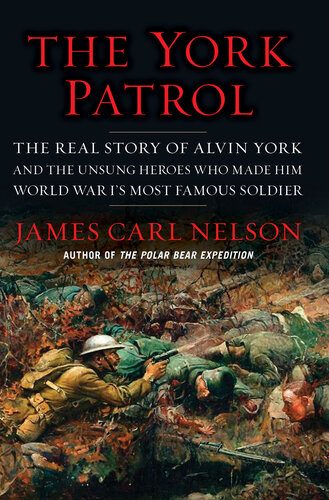
The York Patrol
The Real Story of Alvin York and the Unsung Heroes Who Made Him World War I's Most Famous Soldier
کتاب های مرتبط
- اطلاعات
- نقد و بررسی
- دیدگاه کاربران
نقد و بررسی

September 28, 2020
In this well-researched account, historian Nelson (The Polar Bear Expedition) adds depth to one of WWI’s most celebrated stories: the “single-handed” capture of 132 German soldiers by Cpl. Alvin York. Raised in rural Tennessee, York was a born-again Christian who sought a religious exemption from the draft. Denied multiple times, he eventually determined it was “God’s will” he should go to war. During an October 1918 offensive in France’s Argonne forest, York’s infantry company captured a German unit in a ravine behind enemy lines. As they rounded up the prisoners, German machine gunners firing from the hilltop above killed six Americans. York and other soldiers fired back, killing two dozen and forcing more than a hundred more Germans to surrender. York, who was credited with “the lion’s share of the dead,” received a congressional Medal of Honor and became a reluctant media sensation, sparking resentment among some of his platoon mates. Nelson spotlights York’s forgotten comrades, including Bernard Early, an Irish bartender, and Otis Merrithew, who ran away from home to join the Army under a false name, and packs the account with detailed battlefield logistics. Military history buffs will savor learning the truth behind this WWI legend.

November 15, 2020
A military historian delivers a new biography of one of the best-known American doughboys. Alvin York (1887-1964) won the Medal of Honor for his actions on Oct. 8, 1918, when, "it was said, he single-handedly killed two dozen Germans, captured 132 more, and nabbed thirty-five machine guns to boot." Nelson, the author of three previous books about America's role in World War I, notes that "York was not alone that day." Of a 17-man patrol that went out that morning, 11 returned alive with the prisoners; only York went down in history. His exploits occurred when the patrol moved behind enemy lines, where they stumbled upon a German unit preparing for a counterattack. Believing the Americans were part of a larger group, the unit surrendered. As the patrol was organizing the prisoners, a hidden machine gun killed six and wounded three. The highest-ranking unwounded member, York silenced the machine gun, killed a few more German soldiers who charged the group, and led the prisoners back to American lines. York's achievement earned him a Distinguished Service Cross, soon upgraded to a Medal of Honor. Fame arrived after an adulatory cover article in the April 26, 1919, edition of the Saturday Evening Post, which had a circulation of 2 million. There followed numerous lucrative offers to exploit his fame, which York declined before returning home to Tennessee. Refreshingly, Nelson does not sugarcoat York's remaining years, portraying him as anxious to help his impoverished community but na�ve about human nature. Benefactors gave him a large farm but ran out of money, leaving York with a burdensome mortgage, and his efforts to build local schools met with frustration. The bonanza from Howard Hawks' 1941 hit Sergeant York helped the schools but brought a huge bill for back taxes from the IRS. It also infuriated other members of his patrol, who had long complained that he was hogging all the glory. An admiring but realistic account of an American hero well suited to any WWI buff.
COPYRIGHT(2020) Kirkus Reviews, ALL RIGHTS RESERVED.

December 11, 2020
The latest book by historian Nelson (Five Lieutenants) tackles three interrelated subjects: a recounting of the military experience of Sergeant Alvin York (1887-1964), the origins and dissemination of the legend of York's heroism, and a description of the post-war lives of York and his compatriots. Nelson utilizes a wide range of primary source material in order to describe the experiences of York and his comrades, and, in the process, creates a vivid profile of what later generations would term the "all-American" platoon. While his narration of the movement of York's unit, and the wider strategy of the American Expeditionary Forces, are sometimes ponderous, his reconstruction of the details of the "York Patrol," and how the York legend developed are solidly done. However, Nelson's work is marred by an overuse of colloquialisms; for example, repeating phrases such as "hick from Tennessee." In addition, Nelson does not take advantage of recent World War I historiography. It would have been beneficial if Nelson explained why German soldiers were more willing to surrender by the fall of 1918. In addition, numerous veterans organizations founded after 1919 challenge the assumption that returning soldiers did not speak of their wartime experiences. VERDICT A flawed work that will probably best suit World War I completists.--Frederic Krome, Univ. of Cincinnati Clermont Coll.
Copyright 2020 Library Journal, LLC Used with permission.

February 1, 2021
Gary Cooper won the first of his two best-actor Oscars for the title role in Sergeant York, the 1941 film that dramatized the true story of Alvin Cullum York, an American soldier who, during WWI, virtually single-handedly killed two dozen enemy soldiers and captured more than 130. As Nelson points out in this account, the movie is deservedly acclaimed, and sticks relatively closely to the facts, but the full true story of York's life is far more dramatic and far more interesting. As he did in his three previous books about WWI (including Five Lieutenants, 2012), the author transports readers back in time, giving them not just a story about people but also a picture of what their world was like. His intent here isn't to disprove or debunk the York legend--the man was a true hero, that much is indisputable--but rather to augment it, to add to what we know about Alvin York so that we can better understand what made him a hero. A stirring account of an important incident and time in American history.
COPYRIGHT(2021) Booklist, ALL RIGHTS RESERVED.

























دیدگاه کاربران